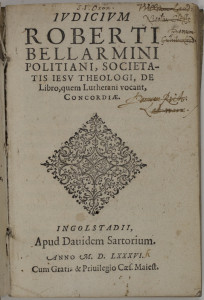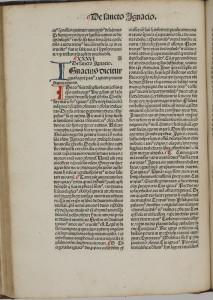The conference celebrating Jesuit education and the 400th anniversary of Heythrop College is a happy exception, with Dr Francesca Knox of Heythrop College providing the benefit of her knowledge of Jesuit theology and theologians. Heythrop College further provided several books, in a welcome collaboration between it, Senate House Library and the Warburg Institute: Heythrop is strong in the Catholic theology absent from the other institutions, which for their part contributed evidence of Jesuit scholarship in other areas and also anti-Jesuit material.
This particular conference, “’For the Greater Glory of God and the More Universal Good’” was rewarding to curate both for the collaborative element and for the range of interests contained within the subject matter. I divided the topic into five themes. The best represented was “Jesuit Scholarship”, with books ranging from Irish history to mathematics, physics, numismatics, Egyptology and even a treatise by Benito Pereira on magic, dream interpretation and astrology, loaned by the Warburg Institute. Linked with scholarship was “Jesuit creativity”, represented by poems by John Donne (a Protestant influenced by Jesuits) and by Gerard Manly Hopkins.
![Christoph Clavius, Epitome arithmeticae practicae (1583), Senate House Library [DeM] L.1 [Clavius] SSR](https://englishstudies.blogs.sas.ac.uk/files/2014/05/Clavius-Arithmetica-188x300.jpg)
Christoph Clavius, Epitome arithmeticae practicae (1583), Senate House Library [DeM] L.1 [Clavius] SSR

Roberto Bellarmino, Judicium de libro quem Lutherani vocant Concordiae (1586), Heythrop College BQ70007. L3
All early printed books proclaim something about book history: for example, about production, audiences, and illustrative methods. Bibliography was inherent in this display with the choice of Christoph Clavius’s arithmetic textbook Epitome Arithmeticae Practicae, about which the mathematical historian Augustus De Morgan wrote in his Arithmetical Books from the Invention of Printing to the Present Time: “Perhaps there are more extensive examples of the square root worked by the old method in this treatise than would easily be found elsewhere”. Library history also slipped in: this same book formerly belonged to the Jesuit College in Brera, Milan, presumably leaving it when the College was suppressed and its books confiscated in 1773. Pride of place for provenance definitely falls to Roberto Bellarmino’s Judicium de libro quem Lutherani vocant Concordiae (1586), in a copy now in Heythrop College. The volume formerly belonged successively to Richard Latewar and Archbishop William Laud (1573-1645), both of St John’s College, Oxford; Nicholas Cliffe, who succeeded Laud in 1616 as incumbent of West Tilbury in Essex; the Society of Jesus in Oxford; and St Mary’s Hall Stonyhurst, the preparatory school for Stonyhurst College.
Dr Karen Attar is an Associate Research Fellow at the Institute of English Studies and the Rare Books Librarian at Senate House Library, University of London.


![Jacobus de Voragine, Legenda aurea (1486), Senate House Library [Incunabula] 87](https://englishstudies.blogs.sas.ac.uk/files/2014/05/Incunabula-87-213x300.jpg)